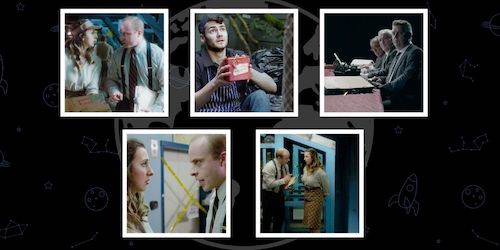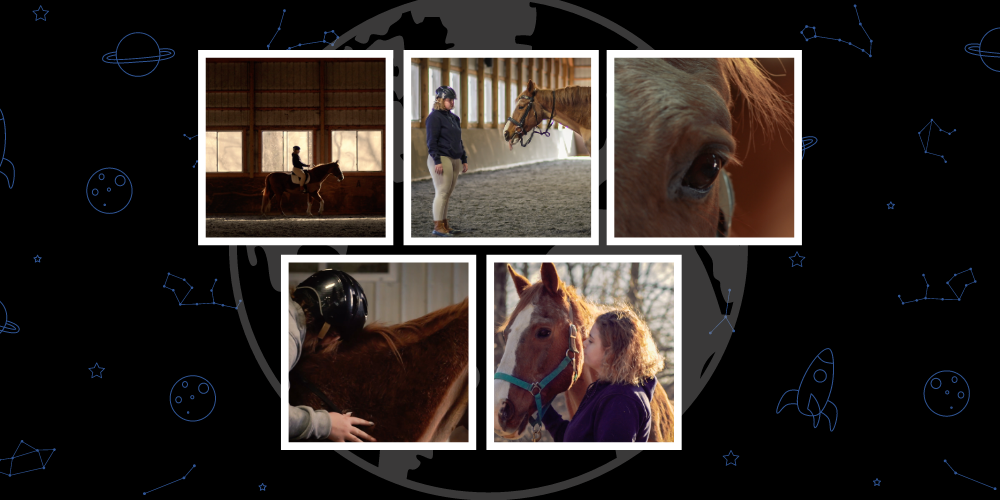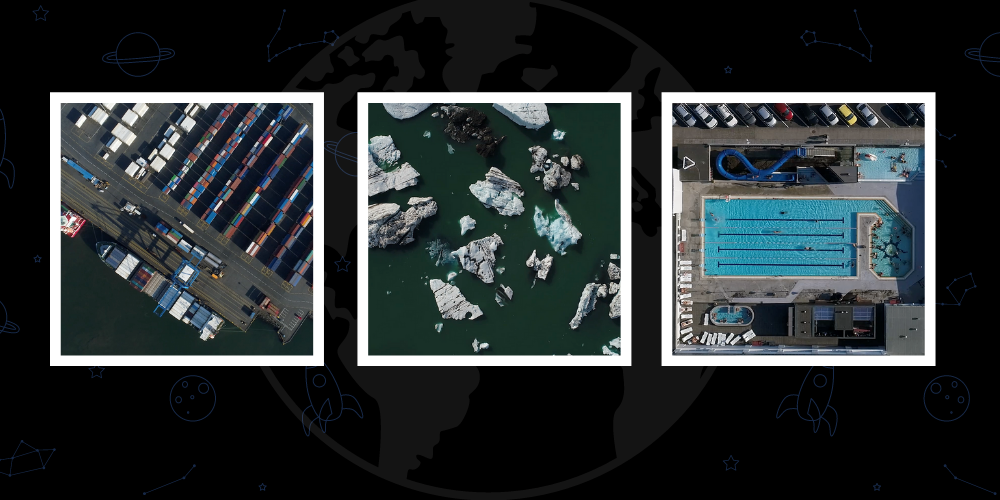Ce mois-ci, le public peut visionner Malibu Taetz Retourner à l'expéditeur (organisée par NFFTY) sur la chaîne YouTube du Planet Classroom Network. Une jeune femme commence sa première journée dans un énorme bureau de poste dans les cieux et reçoit un petit colis rouge sur lequel est inscrit «le sens de la vie», qu'elle envoie involontairement à la terre avant la date prévue. La boîte finit entre les mains d'un jeune homme sur Terre, un lave-vaisselle sort les poubelles. Moira doit choisir entre aider la personne qui a reçu le colis et aider l'univers à rétablir l'ordre. Ce qui suit est un hilarant, mystique, et une histoire cathartique qui est très amusante pour les téléspectateurs de tous âges.
La recherche globale pour l'éducation a le plaisir d'accueillir le directeur Malibu Taetz.
Malibu, ton film est vraiment bien fait! Les ensembles, travail de caméra, et le jeu étaient tous très raffinés. Surtout, le sujet était vraiment unique. Qu'est-ce qui vous a donné envie d'avoir un film sur le sens de la vie, de toutes choses?
Merci beaucoup! je suis vraiment contente que tu aies aimé le regarder. Nous avions une très bonne équipe à constituer Retourner à l'expéditeur. Si, Je suis juste vraiment fier de ce que tout le monde a fait et de la façon dont tout s'est déroulé. En termes de sens de la vie dans le film, Je suppose que je voulais faire quelque chose qui traiterait de ces concepts métaphysiques plus larges et avoir un film avec un sens plus profond et en même temps ne pas être déprimant. Parce que je ne le fais pas…bon peut-être que je parlerai un peu plus de ce que le film signifie pour moi un peu plus tard, mais je me souviens d'avoir essayé de trouver une idée d'histoire et de me demander, "D'accord, d'où viennent les idées?", and could they actually belong to anybody like good people have possession of an idea or what if there was some mailroom up in the cosmos where all the great ideas were stored and they were scheduled to be sent down to different people. That was just trying to wonder where an idea could come from and that’s kind of where Retourner à l'expéditeur got started.
The vision of your film was very clear, and I felt engrossed in the story as soon as the premise was revealed. What were/are your main influences when it comes to filmmaking, et comment les voyez-vous inspirer votre travail?
Donc pour Retourner à l'expéditeur, Josh et moi avons apporté toutes sortes de choses que nous aimons de tous les domaines du spectre. Joshua Vanderlinden est le co-scénariste et le producteur du film, et nous avons découvert que nous avions vraiment cet amour pour la construction du monde. Alors le monde pour lequel nous avons créé Retour à Sender était si énorme que nous devions être très sélectifs en particulier sur ce que nous montions à l'écran et nous avons juste fait allusion à. So I was really inspired by the quirky and very unusual style of filmmaking from these two filmmakers in the 1930s, Frank Capra and Preston Sturges, and we were also both inspired by things like Terry Gilliam’s Time Bandits and the Coen Brothers’ The Hudsucker Proxy. But on the other end of the spectrum, we were heavily inspired by Greek mythology and things like Prometheus stealing fire from the gods and bringing it down to Earth or like Pandora’s Box, et aussi quelques nouvelles vraiment uniques et imaginatives de JRR Tolkien. Nous voulions donc créer quelque chose qui pourrait mélanger ces grandes idées mythologiques avec ce style de cinéma original à l'ancienne et c'était vraiment amusant à explorer.. Et après des choses comme Le bon endroit sortit de, ce dont j'étais tellement excité parce qu'ils ont fait exactement cela et l'ont si bien géré.
Comme je l'ai noté avant, votre décision de faire tourner votre histoire autour du sens de la vie est fascinante. Was the decision to make the “meaning of life” in the film a lemon speak to your true feelings about the meaning of life? Dans le cas contraire, do you believe that trying to find the meaning of life is an important task, as your film suggests?
Si, the lemon was actually an accident. Originally we had sheet music in the box and then we had nothing in the box and then there was this one night that Josh and I were typing, or he was typing and I was just talking, and somehow some words got garbled and there ended up being a lemon in the box suddenly and it was about 2 un m. so we found this so funny that the idea that they put a placeholder in the box and when you open it there’s just this lemon inside. And then the next morning, it was still funny so we kept that! But I think to me at the heart of Retourner à l'expéditeur is this picture of one person helping another person. So I got this sort of idea that you could take all of the great philosophers and thinkers and scientists in the world and put them together in this room and have them talk for a thousand years and they still wouldn’t really be able to answer the question of “What is the meaning of life?", or you could tell us one person helping another person and although this may not exactly answer what the meaning of life is I think it’ll get you a lot closer to it. And that’s kind of the crux of Retourner à l'expéditeur. You have this contrast of the organizing personnel, the top who are meant to be scheduling and discussing and giving meaning to everything in the universe, and then just this little store kind of slips under their radar of Moira the clerk helping Bradley the dishwasher who mistakenly gets sent this lemon.
What were the biggest challenges while making Retourner à l'expéditeur? Were there any aspects of the writing or production that stick out in that regard?
The biggest challenge for us is probably similar to what it is for many Indie filmmakers which is just money. Donc pour Retourner à l'expéditeur we had to create this huge almost infinite world. We knew from the start that we wanted to rely on old school techniques like matte paintings and small models, but from there the name of the game is what you show and what you let the viewer’s imagination fill in. So we put a lot of thought into that. There’s so many stories of how we just seemingly accidentally ended up with the locations, like a retired 1950s Canada Post building and the smoke-filled department of forgetfulness. À la fin, our production designer, Anna Listopad, did a fantastic job in making grand things out of what we gave her, and our cinematographer, Martin Dudzik, did this fantastic job of shooting and framing it, and I learned a lot about filmmaking from him. I think everybody came together in a really special way to make this story work, so we could overcome the challenge that is always present, at least so far in my however long… not very long career yet, of money is that challenge. But when you have passionate people that’s…and creative people who can come up with solutions that’s how you get around that.
Do you have any tips or knowledge to pass onto young, aspiring filmmakers? What are some resources you would recommend to anyone trying to get into the field?
I would say several things. One is to find the people who really love to do the same things that you love to do. Like collaboration among passionate people in common creative goal is one of those wonderful things in the world and everybody really cares. You can do an awful lot with a shoestring budget. Another thing I’d say is don’t be afraid to knock on doors with big important people behind them because you never know what might open. Like to get the mailroom scenes, I just walked into the huge postal building, told the person at the desk what we wanted to do, and asked who I could talk to about it. J'étais à peu près sûr que nous obtiendrions un non, mais il n'y avait rien à perdre et nous avons eu tellement de non pendant Retourner à l'expéditeur mais on a fait le film avec les oui qu'on a eu. Et le bâtiment postal s'est avéré être un oui, et c'était l'un des meilleurs oui que nous ayons eu dans le film. Enfin, Je dirais que même si un film n'arrive pas tout de suite, sauvegarde le. Ne t'en débarrasse pas et ne dis pas que tu n'y arriveras jamais. Comme gardez-le dans votre tiroir et ressortez-le quand le temps sera prêt. Retourner à l'expéditeur was originally pitched to and rejected by a film competition in Vancouver, but I kept it! And later we were able to make it with a better script and with a perfect team. So hang on to your ideas and make those ones you can make right now, and save those other ones you can’t make right now for later.
C.M. Rubin and Malibu Taetz
Don’t Miss Malibu Taetz’s Retourner à l'expéditeur (organisée par NFFTY) sur la chaîne YouTube du Planet Classroom Network.







Commentaires récents